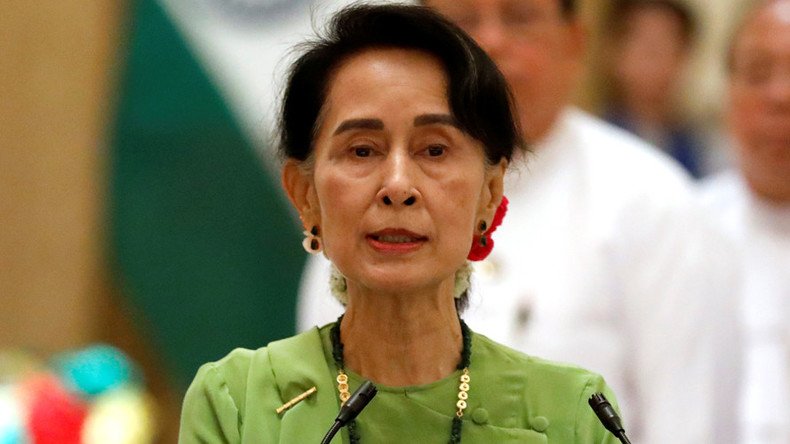400k+ sign pro-Rohingya petition to strip Suu Kyi of Nobel Prize

A change.org petition demanding that the Nobel Committee rescind State Counsellor of Myanmar Aung San Suu Kyi’s Nobel Prize for failing to stop a “crime against humanity in her country” has garnered more than 400,000 signatures.
"Over the past three years more than 140,000 Rohingya Muslims have been living in grave conditions in refugee camps in Myanmar and in many other countries, including Indonesia," the Change.org petition explains.
"3,000 Rohingyas have been killed within three days between 25 and 27 August, 2017," the petition states, citing the European Rohingya Council (ERC).
270,000 flee #Myanmar in two weeks as IOM scales up emergency response in Bangladesh ➡️ https://t.co/YPfvYJ1QwFpic.twitter.com/XI0fkpoc1Y
— IOM (@UNmigration) September 8, 2017
The UN migration agency, the IOM, confirmed Thursday that a total of 270,000 people have now fled the violence in Myanmar since August 25.
Makeshift refugee centers and healthcare facilities in Bangladesh are struggling to cope with the unprecedented influx. The IOM has so far allocated $1 million in emergency funding to help with the crisis.
The petition's authors ask a rather pointed question: "What is wrong with being a Muslim, Suu Kyi?"
This is in reference to past remarks Suu Kyi made following a 2013 interview with the ‘BBC Today’ anchor, Mishal Husain.
“No-one told me that I was to be interviewed by a Muslim,” Suu Kyi is alleged to have said, according to the petition.
Thousands take to streets in support of Myanmar Rohingya Muslims in Chechnya, Russia (PHOTO, VIDEO) https://t.co/pFfNMH25a3pic.twitter.com/a1FBBcaPpE
— RT (@RT_com) September 4, 2017
Suu Kyi was awarded the Nobel Peace prize in 1991 for her activism against the military junta in Burma (now Myanmar) which resulted in her house arrest for 15 years, from which she was released in 2010. In 2015, Suu Kyi’s National League for Democracy won the general election, and she became de-facto leader of the country under the official title of state counsellor.
However, the Norwegian Nobel committee has ruled out rescinding Suu Kyi's prize, saying only her previous work would be taken into account rather than any subsequent actions.
"Neither Alfred Nobel's will nor the statutes of the Nobel Foundation provide for the possibility that a Nobel Prize – whether for physics, chemistry, medicine, literature or peace – can be revoked," Olav Njolstad, head of the Nobel Institute, told AFP.
"Only the efforts made by a laureate before the attribution of a prize are evaluated by the Nobel committee," he added.
Moscow Muslims gather in front of #Myanmar Embassy in solidarity with #RohingyaMuslimshttps://t.co/MnXISDBugBpic.twitter.com/aOjbegPKTc
— RT (@RT_com) September 4, 2017
Suu Kyi has described the backlash over her handling of the Rohingya Muslim crisis as "a huge iceberg of misinformation...with the aim of promoting the interest of the terrorists,” as cited by the AFP.
Long-time friend and confidant, retired Archbishop Desmond Tutu, has also condemned Suu Kyi’s mishandling of the crisis.
"If the political price of your ascension to the highest office in Myanmar is your silence, the price is surely too steep," Tutu said in a statement.
"It is incongruous for a symbol of righteousness to lead such a country; it is adding to our pain," he said noting that "the images we are seeing of the suffering of the Rohingya fill us with pain and dread."












